常用动词的习惯用法.
Unit 4 习惯用法语法

你想要某物/做某事吗?
Would you like to have a try?
You could dosth.
你可以做某事。
You could write to her.
2、常用答语:
肯
定
答
语
Good idea! / That’s a good idea! / OK. / All right. / Great.
Unit 4习惯用法语法
一、习惯用法:
1.allowsb. to dosth.允许某人做某事
2.Whydon’t you dosth.?你为什么不做某事呢?
3.wantto dosth.想要做某事
4.wantsb.to dosth.想要某人做某事
5.letsb. dosth.让某人做某事
6.mindsbdoingsth.介意某人做某事
14. It’s +adj(形容词)+to dosth.做某事是…的。
二.语法讲解:
(一)Why don’t you…?等提建议的句型及常用答语
1、常用提建议的表达:
句型
意义
例句
Why don’t you dosth.?
= Why not dosth.?
你为什么不做某事呢?
Why don’t you talk to your parents?
7.findsbdoingsth.发现某人在做某事
8.refuseto dosth.拒绝做某事
9.offerto dosth.主动提出做某事
10.tellsb.to dosth.告诉某人做某事
11.not…until…直到…才…
英语动词七种形式的用法

I. 动词原形的用法:1、除单三人称的一般现在时,其它人称作主语,动词用原形。
2、将来时态shall, will, should, would之后用动词原形。
3、祈使句句子开头用动词原形。
4、助动词do, does, did之后用动词原形。
5、情态动词can、could、may, might, have/has to, must, need, dare ,ought to之后用动词原形。
6、使役动词let、make、have 之后用动词原形。
7、感官动词see、watch、notice、hear、feel、find之后用动词原形(说明动作已经结束)。
8、had better 之后用动词原形。
9、why / why not 之后用动词原形。
10、would rather do sth . than do sth .11. prefer to do sth. rather than do sth./ prefer doing sth. to doing sth.12.help sb. do sth.II.动名词的用法:1.介词之后动词要用动名词形式(动词+ing)2.部分动词之后的动词只能用动名词形式:enjoy, finish, practice, mind, spend, dislike, find , keep3.部分短语后省略了介词in:have fun/ problems/ difficulties/ trouble /a good time doingbe busy doing , be worth doing , can’t help doing , feel like doing , do some doing sth.4.下面这些动词既可跟动名词又可跟不定式:like / love / hate doing (doing表示习惯)(to do表示具体的动作)stop doing(表示停止)(doing表示开始做不定式的动作);remember , forget (不定式表示未做;动名词表示已做);try (doing表示试着做;to do表示努力做);go on (doing继续做相同的事to do继续做不同的事) ;begin , start (to do与doing区别不大);need (人作主语用to do ;物作主语用doing表示被动);mean(人作主语用to do表示“打算做”;事/ 物作主语用doing表示“意味着”);5.这些动词既可跟动词原形,又可跟ing形式:see,watch,hear.notice(用原形是指动作结束,ing表示动作正在进行)6.go swimming/cleaning/fishing/skating/skiing….7.No parking/swimming/spitting…..8.do some cleaning/washing/reading…III.动词不定式的用法:1.ask/tell/want/order/teach/wish/would like/invite/encourage sb. to do sth.2.ask/tell/want/order/teach/wish/would like/invite/encourage sb. not to do sth.3.Help...(to) do sth. 4、主系表+ 不定式(to do)5.主系表+for sb + 不定式(to do)6.部分动词既可跟动名词又可跟不定式:(同动名词6)7.疑问词+不定式(to do)可以把复合句变为简单句,(to = 主语+will/would/can)IV.动词单三(动词+s / es)用于第三人称单数作主语的一般现在时态。
动词用法总结
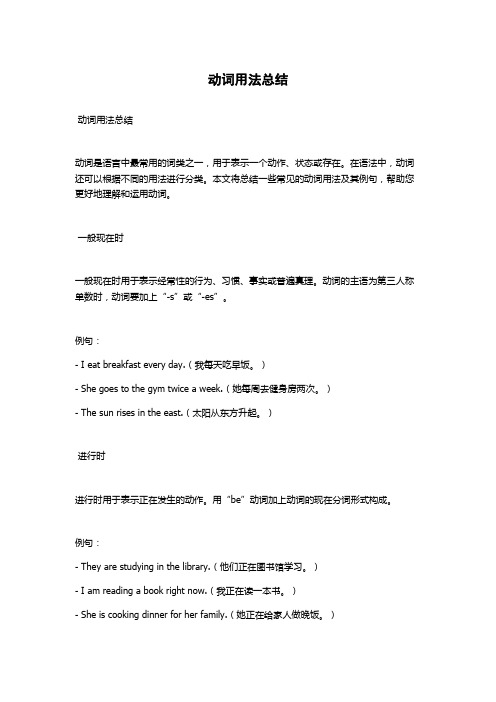
动词用法总结动词用法总结动词是语言中最常用的词类之一,用于表示一个动作、状态或存在。
在语法中,动词还可以根据不同的用法进行分类。
本文将总结一些常见的动词用法及其例句,帮助您更好地理解和运用动词。
一般现在时一般现在时用于表示经常性的行为、习惯、事实或普遍真理。
动词的主语为第三人称单数时,动词要加上“-s”或“-es”。
例句:- I eat breakfast every day.(我每天吃早饭。
)- She goes to the gym twice a week.(她每周去健身房两次。
)- The sun rises in the east.(太阳从东方升起。
)进行时进行时用于表示正在发生的动作。
用“be”动词加上动词的现在分词形式构成。
例句:- They are studying in the library.(他们正在图书馆学习。
)- I am reading a book right now.(我正在读一本书。
)- She is cooking dinner for her family.(她正在给家人做晚饭。
)一般过去时一般过去时用于表示在过去某个特定时间发生或完成的动作。
例句:- I watched a movie last night.(昨晚我看了一场电影。
)- He lived in New York for five years.(他在纽约住了五年。
)- We visited our grandparents during the summer vacation.(在暑假期间,我们去看望了爷爷奶奶。
)完成时完成时用于表示过去某个时间已经发生或完成的动作,强调该动作对当前的影响。
例句:- I have finished my homework.(我已经完成了我的作业。
)- She has visited many countries in her life.(她在一生中已经去过很多国家。
英语复习常用动词习惯用法
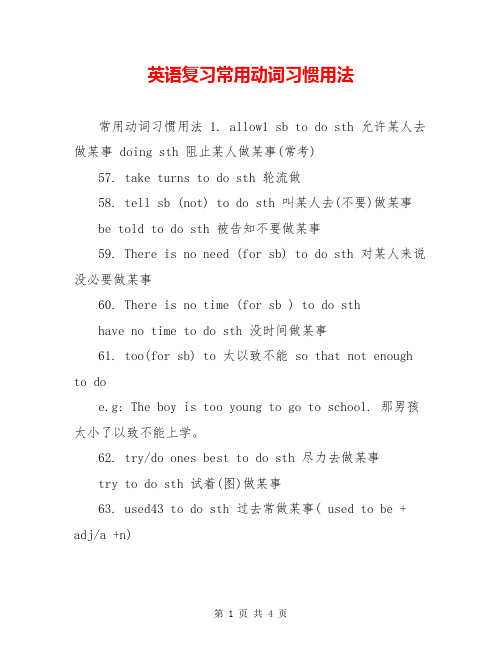
英语复习常用动词习惯用法常用动词习惯用法 1. allow1 sb to do sth 允许某人去做某事 doing sth 阻止某人做某事(常考)57. take turns to do sth 轮流做58. tell sb (not) to do sth 叫某人去(不要)做某事be told to do sth 被告知不要做某事59. There is no need (for sb) to do sth 对某人来说没必要做某事60. There is no time (for sb ) to do sthhave no time to do sth 没时间做某事61. too(for sb) to 太以致不能 so that not enough to doe.g: The boy is too young to go to school. 那男孩太小了以致不能上学。
62. try/do ones best to do sth 尽力去做某事try to do sth 试着(图)做某事63. used43 to do sth 过去常做某事( used to be + adj/a +n)e.g: Mr wang used to be a teacher worker. 王先生过去是一位工人。
I used to live in the country. 过去我住在农村。
64. want/would like to do sth 想做want/would like sb to do sth 想某人做feel like doing sth 喜爱做某事(注意like后接动词ing形式)65. warn44 sb (not) to do sth 警告某人做某事(或不要做某事)66. Why dont you do sthWhy not do sth ( 为什么不(表建议的句型,注意用动词原形) )表示建议的句型还有:What How about(如果是动词,要用ing形式)Shall we67. Would you like (sb) to do sth Yes, Id love to .68. Would you mind doing sth 你介意做某事吗Never mind/Not at all/of course45 not/certainlynot . (从不介意/一点也不介意/当然不会了)69. Would you please (not) do sth 你可不可以不做70. finish doing sth enjoy doing sth practise doing sth be good at doing sth be good at doing sth thank you for doing sth stop doing sth be good at doing sth give up doing sth mind doing sth stop sb from doing sth go on doing sth be busy doing sthsee/hear/watch sb doing sth feel like doing sth hate doing sth like doing sth do well in doing sth be afraid of doing sth be interested in doing sth make a contribution46 to sth/doing sth71. 非延续性动词(终止性动词)1.buy---have(has)had2.borrow---have(has)kept3.leave---have(has)been away4.go ---have(has)been away/ine ---have(has)here/in6.die47 ---have(has)been dead487.join---have(has)been a member of/in8.begin---have(has)on 8.stop---have(has)been overexample: 他的狗死了3天了.: His dog has been dead for three days. It is three days since49 his dogdied50. His dog died three days ago.72. 感官动词:(主动语态不带to)1.hear/see/watch sb do sth 或 2. hear/see/watch sb doing sth1. We often hear him sing the song.2. I saw51 him swimming in the river just now.被动语态带to:1. He is often heard to sing the song.役使动词: (主动语态不带to) make/let sb do sth.His father often makes him do this and that.被动语态带to:He is often made52 to do this and that by his father.。
初中英语常用动词习惯用法总结
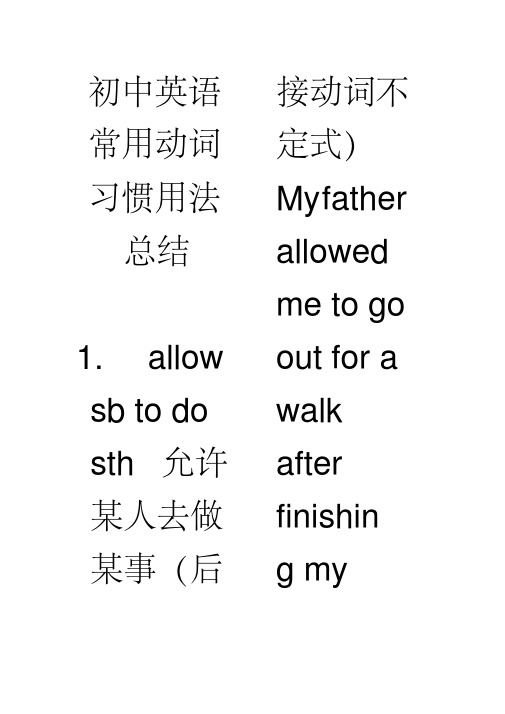
I am
was busy busy with
washing my work.
my car at 8. be
that time. coming/g
那时候我 oing/lea
正忙于清 ving/fiy
洗我的车 ing/movi
子。
ng/dying
(某些位
移动词用
进行时态 时表将 来) the bus is coming/t he dog is dying. 9. be excited to do sth
have a
afraid to
dinner
ask me
with them question
yesterday s.
.
4. be sth 害
afaid of 怕某物
doing sth He is
害怕做某 afraid of
事
snakes.
I am
6. be
afraid of amazedto
going out do sth
28.
29. get
让某人做 /have a
某事(后接 chance to
动词原形) do sth
get sb to 得到一个
do sth
做某事的
make 机会
sb do sth 30. giv
e/pass/s
how/lend /sell sb sth/sth to sb
ed in
We are
Chinese. ready for
13.
the exam.
be/get
Be ready
ready
to do sth
for/to do 为做某事
动词的用法顺口溜
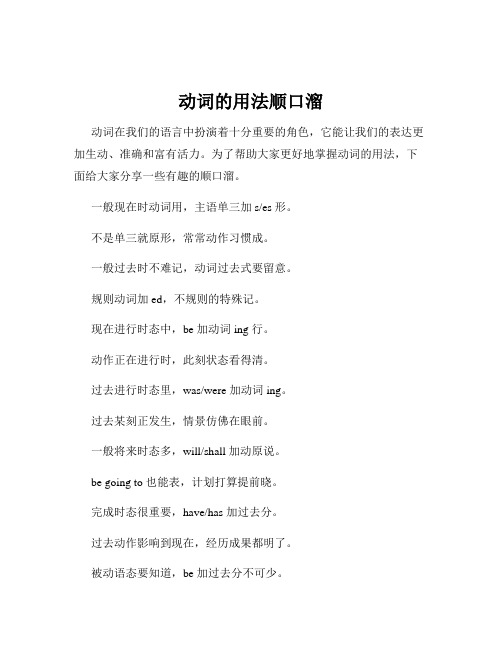
动词的用法顺口溜动词在我们的语言中扮演着十分重要的角色,它能让我们的表达更加生动、准确和富有活力。
为了帮助大家更好地掌握动词的用法,下面给大家分享一些有趣的顺口溜。
一般现在时动词用,主语单三加 s/es 形。
不是单三就原形,常常动作习惯成。
一般过去时不难记,动词过去式要留意。
规则动词加 ed,不规则的特殊记。
现在进行时态中,be 加动词 ing 行。
动作正在进行时,此刻状态看得清。
过去进行时态里,was/were 加动词 ing。
过去某刻正发生,情景仿佛在眼前。
一般将来时态多,will/shall 加动原说。
be going to 也能表,计划打算提前晓。
完成时态很重要,have/has 加过去分。
过去动作影响到现在,经历成果都明了。
被动语态要知道,be 加过去分不可少。
动作承受者为主语,“被”字意思要记牢。
使役动词 let make have,后跟不带 to 不定式。
感官动词 see hear watch,后可跟原形或 doing 式。
动词短语搭配多,介词副词要结合。
break out 爆发起,come out 出版来。
put on 穿上衣,take off 脱下忙。
turn on 打开灯,turn off 关掉光。
look for 寻找物,find 找到心里喜。
give up 放弃难,hold on 坚持易。
比如说,“一般现在时动词用,主语单三加 s/es 形。
不是单三就原形,常常动作习惯成。
”这一句就很好地概括了一般现在时中动词的变化规则。
当主语是第三人称单数时,动词要发生变化,通常是在词尾加 s 或者 es,比如“He likes apples”而当主语不是第三人称单数时,动词就用原形,像“We play football every day”再看“一般过去时不难记,动词过去式要留意。
规则动词加 ed,不规则的特殊记。
”它清晰地指出了一般过去时中动词的形式。
对于规则动词,我们直接在词尾加上 ed,像“walked”“played”;但对于不规则动词,就需要我们特别去记忆,比如“go”的过去式是“went”,“eat”的过去式是“ate”。
英语复习常用动词习惯用法

英语复习常用动词习惯用法常用动词习惯用法大家有知道的吗?如果没有,可以看小编总结的哦!接下来,小编给大家准备了英语复习常用动词习惯用法,欢迎大家参考与借鉴。
英语复习常用动词习惯用法常用动词习惯用法1. allow1 sb to do sth 允许某人去做某事(后接动词不定式)My father allowed3 me to go out for a walk after finishing my homework.2. asked sb (not) to do sth 叫某人做事某事(叫某人不要去做某事)My father asked me to study hard.He asked me not to swim alone4.be asked to do sth 被叫去做某事/被邀请去做某事I was5 asked to have a dinner with them yesterday.3. be afraid to do sth 害怕做某事She is afraid to ask me questions.4. be afaid of doing sth 害怕做某事I am afraid of going6 out at night.5. be afaid of sth 害怕某物He is afraid of snakes.6. be amazed7 to do sth 对做某事感到惊讶He was amazed to meet the girl there.be amazed at sth 对某事感到惊讶they were amazed at the news8.7. be busy doing/with sth 忙于做某事(常考)e2.g: I was busy washing9 my car at that time. 那时候我正忙于清洗我的车子。
I am busy with my work.8. be coming/going/leaving/fiying/moving/dying10(某些位移动词用进行时态时表将来)the bus is coming/the dog is dying.9. be excited11 to do sth 对做感到兴奋Jacky was excited to travel12 there by plane.be excited at sthLily13 was excited at his words.be excited about doing sthhe was excited about passing the exam14 without going overing books.10. be frightened15 to do sth 害怕去做某事Sam is frightened to ride a horse.11. be glad/happy to do sth 高兴去做某事she is happy to clean the blackboard with me.be pleased16 to do sth高兴做某事she was pleased to help the old man yesterday.be pleased with sth 对某事感到高兴/满意the teacher was pleased with my answer.12. be interested17 in sth/doing sth 对某事感兴趣/对做某事感兴趣she is interested in swimming in the river.My btother is interested in Chinese.13. be/get ready for/to do sthBe ready for sth 为某事做好了准备We are ready for the exam.Be ready to do sth 为做某事做好了准备We are ready to have a birthday party for her.get ready for sth为某事在做准备We are getting ready for the exam.get ready for sth 为做某事而做准备13. be sorry to do sth 对做某事感到抱歉14. be surprised18 to do sth 对做某事感到惊奇be surprised at sth 对某事感到惊奇15. be worth19 doing sth 值得做某事(worth 后接动词-ing 形式,常考)16. begin to do sthbegin/start to do/doing sth ( 开始去做某事)17. can/be able20 to afford21 (to buy) sth 有能力购买(供)18. can/may/must do sth could/would22/should/might do sth19. cant wait to do sth 迫不急待地去做某事20. decide23 to do sth 决定去做某事make up ones mind24 to do sth 下决心去做某事(常考)make a decision25 to do sth 对做某事作出决定21. deserve26 to do sth 值得/应该做22. encourage27 sb to do sth 鼓励某人去做某事23. enjoy doing sth 乐意去做某事24. expect28 (sb) to do sth 期望去做某事25. fail29 to do sth 做某事失败succeed30 doing sth 成功做了某事26. finish doing sth 做完某事(后接动词-ing形式)(常考)27. follow sb to do sth 跟随某人去做某事28. get sb to do sthmake sb do sthlet sb do sth (让某人做某事(后接动词原形))29. get/have a chance31 to do sth 得到一个做某事的机会30. give/pass/show/lend/sell sb sth/sth to sbbuy/get/bring sb sth/sth for sb31. go on to do sth 继续做事(常考)go on doing sth 继续做事(常考)32. hate32 to do/doing sth 讨厌/不喜欢做某事33. have fun doing sth34. have problems33 doing sth 做某事遇到困难35. have sb do sthhave sth donehave sth to do 工有事要做36. hear sb do sth 听到某人做某事(后接动词原形,常考)hear sb doing sth 听到某人正在做某事(常见)37. help to do sth 帮忙做某事help sb (to) do sth 帮助某人做某事38. hope/wish to do sth 希望做某事wish sb to do sth 希望某人做某事39. I t seems35 that 这像是(后接从句)seem34 to do sthseem +adj40. Its + adj+(for sb) to do sth .Its+adj +(of sb) to do sthe.g: Its glad for him to hear the news.41. It takes sb some time/money to do sth . 花费某人多长时间做某事(常考)42. pay36 for cost37 spendon.. it take to do sth43. Its best for sb to do sth. 对某人来说做某事是最好的had38 better do sth 最好做某事(注意had没有时态和人称的变化,better后接动词原形)44. Its time for sb to do sth 是某人做某事的时候了45. keep (on)doing sth 坚持做某事(常考)keep sb doing sth 让某人做某事(常考)keep sb from doing sth 阻止某人做某事(常考)keep sb/sth +adjkeep the book for 2 days 借这本书两天(不要用borrow或lend)46. learn to do sth 学做某事learn sth from sb 向某人学习47. like to do/doing sth 喜欢做某事like sb to do sth 喜欢某人做某事48. need to do sthneed doing sth/to be doneneed sth neednt do sth(需要做某事)49. prefer39 to do sth rather40 than do sth 宁愿而不愿(常考)prefer doing sth to doing sth 喜欢做胜过做e.g: I prefer reading41 books to going shopping. 比起购物来,我更爱读书。
6种动词原形的用法
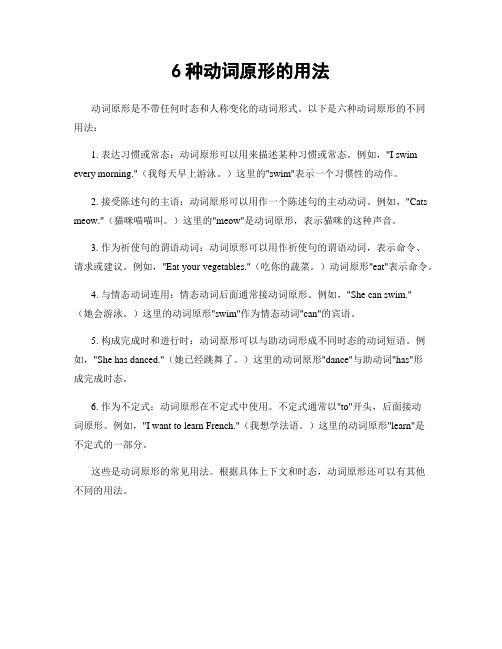
6种动词原形的用法动词原形是不带任何时态和人称变化的动词形式。
以下是六种动词原形的不同用法:1. 表达习惯或常态:动词原形可以用来描述某种习惯或常态。
例如,"I swim every morning."(我每天早上游泳。
)这里的"swim"表示一个习惯性的动作。
2. 接受陈述句的主语:动词原形可以用作一个陈述句的主动动词。
例如,"Cats meow."(猫咪喵喵叫。
)这里的"meow"是动词原形,表示猫咪的这种声音。
3. 作为祈使句的谓语动词:动词原形可以用作祈使句的谓语动词,表示命令、请求或建议。
例如,"Eat your vegetables."(吃你的蔬菜。
)动词原形"eat"表示命令。
4. 与情态动词连用:情态动词后面通常接动词原形。
例如,"She can swim."(她会游泳。
)这里的动词原形"swim"作为情态动词"can"的宾语。
5. 构成完成时和进行时:动词原形可以与助动词形成不同时态的动词短语。
例如,"She has danced."(她已经跳舞了。
)这里的动词原形"dance"与助动词"has"形成完成时态。
6. 作为不定式:动词原形在不定式中使用。
不定式通常以"to"开头,后面接动词原形。
例如,"I want to learn French."(我想学法语。
)这里的动词原形"learn"是不定式的一部分。
这些是动词原形的常见用法。
根据具体上下文和时态,动词原形还可以有其他不同的用法。
- 1、下载文档前请自行甄别文档内容的完整性,平台不提供额外的编辑、内容补充、找答案等附加服务。
- 2、"仅部分预览"的文档,不可在线预览部分如存在完整性等问题,可反馈申请退款(可完整预览的文档不适用该条件!)。
- 3、如文档侵犯您的权益,请联系客服反馈,我们会尽快为您处理(人工客服工作时间:9:00-18:30)。
常用动词习惯用法1. allow sb to do sth 允许某人去做某事(后接动词不定式My father allowed me to go out for a walk after I finished my homework.2. asked sb (not to do sth 要求某人做某事/要求某人不要做某事My father asked me to study hard.He asked me not to swim alone.be asked to do sth 被要求去做某事/被邀请去做某事I was asked to have dinner with them yesterday.3. be afraid to do sth 害怕做某事She is afraid to ask me questions.4. be afaid of doing sth 害怕做某事I am afraid of going out at night.5. be afaid of sth 害怕某物He is afraid of snakes.6. be frightened to do sth 害怕做某事Sam is frightened to ride a horse.7. be angry with sb 对某人生气be angry at sth 对某事生气8. be amazed to do sth 对做某事感到惊讶He was amazed to meet the girl there.be amazed at sth 对某事感到惊讶They were amazed at the news.9. be busy doing sth 忙于做某事be busy with sth 忙于某事e.g: I was busy washing my car at that time. 那时候我正忙于清洗我的车子。
I am busy with my work.10. be coming/going/leaving/flying/moving/dying(某些位移动词用进行时态时表将来I’m leaving at 5 o’clock tomorrow afternoo n.The bus is coming. 车就要来了。
The dog is dying. 这条狗快要死了。
11. 对做…感到兴奋be excited to do sthbe excited about doing sthJacky was excited to travel there by plane.he was excited about passing the exam without going overing books.be excited at sth 对……感到兴奋Lily was excited at his words.12. be glad/happy to do sth 高兴做某事she is happy to clean the blackboard with me.be pleased to do sth高兴做某事she was pleased to help the old man yesterday.be pleased with sth 对某事感到高兴/满意the teacher was pleased with my answer.13. be interested in sth/doing sth 对某事感兴趣/对做某事感兴趣she is interested in swimming in the river.My btother is interested in Chinese.13. be/get ready for/to do sthbe ready for sth 为某事做好了准备We are ready for the exam.be ready to do sth 为做某事做好了准备We are ready to have a birthday party for her.get ready for sth为某事在做准备We are getting ready for the exam.get ready to do sth 为做某事而做准备14. be sorry to do sth 对做某事感到抱歉be sorry for sth 对……感到抱歉I’m sorry for what I said yesterday.15. be surprised to do sth 对做某事感到惊奇be surprised at sth 对某事感到惊奇16. be worth doing sth 值得做某事(worth 后接动词-ing形式 be well worth doing sth 非常值得做某事be worthy of doing sth 值得做某事17. 开始做某事begin/start to dobegin/start doing sth18. 能做某事can do sthbe able to do sthcan/could afford (to buy/pay sth有能力购买(支付……19. can/may/must do sthcould/would/should/might do sth20. can’t wait to do sth 迫不急待地去做某事can’t help doing sth 情不自禁做某事I can't wait to go with you.She could’t help crying.21. decide to do sth 决定去做某事make a decision to do sth (decision是decide的名词形式make up one’s mind to do sth 下决心去做某事22. deserve to do sth 值得/应该做……deserve sth 值得……You’ve been working all m orning—you deserve a rest.= You’ve been working all morning—you deserve to have a rest.23. encourage sb to do sth 鼓励某人去做某事24. enjoy doing sth 喜欢去做某事25. expect to do sth 期望去做某事expect sb to do sth 期望某人去做某事希望去做某事hope to dowish to dowish sb to do sth希望某人去做某事(Note:没有hope sb to do 26. fail to do sth 做某事失败succeed in doing sth 成功做了某事27. finish doing sth 做完某事(后接动词-ing形式28. follow sb to do sth 跟随某人去做某事29. 让某人做某事(后接动词原形get sb to do sthmake sb do sthlet sb do sthhave sb do sthNote: make. Have后面跟省略to的不定式,但在被动语态中应把to加回来。
Eg: Mother made me do the housework.I was made to do the housework.30. get/have a chance to do sth 得到一个做某事的机会31. give/pass/show/lend/sell sb sth 给/递/给……看/借出/卖……给某人give/pass/show/lend/sell sth to sbbuy/get/bring sth for sb 为某人……买/得到/带来某物buy/get/bring sb sth32. go on to do sth 继续做另外一件事go on doing sth 继续做原来的事33. stop to do sth 停下来做另外一件事stop doing sth 停下原来的事34. hate to do/doing sth 讨厌/不喜欢做某事35. have fun doing sth 做……玩得愉快36. have some(no problems/difficulty/trouble doing sth 做某事有(没有困难I have some difficulty learning English.37. 让某人做某事(后接动词原形have sb do sthhave sth done 让……被做I have my hair cut yesterday.我昨天理了发。
have something/nothing to do with sb 与某人有/无关38. hear sb do sth 听到某人做某事(后接动词原形,hear sb doing sth 听到某人正在做某事(后接动词-ing形式see/watch sb do sth 看到某人做某事see/watch sb doing sth 看到某人正在做某事be seen/heard to do sth 做某事被看见/听见(Note:被动语态时,不定式的to要加回来,同make和have39. help to do sth 帮忙做某事help sb (to do sth 帮助某人做某事40. It seems that 好像/似乎……(后接从句seem to do sthseem (to be+adj/n.I seem to have lost my keys. 我觉得好像丢了钥匙。
She seems happy today.He seems to be there.The baby seems to be asleep.41. It’s + adj+(for sb to do sth . (句中应选择important, necessary,difficult,hard,easy等形容词It’s+adj +(of sb to do sth. (句中应选择nice, kind, friendly, strong等形容人的品格等的形容词e.g: It’s important for him to hear the news.= To hear the news is important for him.It’s very nice of you to send me flowers.= You are very nice to send me flowers42. pay (sb money for s th…为某物付(某人钱sth cost sb money 某物花费某人….. 钱sb spend money on sth….. 某人花费….. 钱在某物上sb spend time (in doing sth 某人花费…..时间做某事it took/takes/will take sb time to do sth 做某事花费某人多长时间43. It’s best for sb to do sth. 对某人来说做某事是最好的had better do sth 最好做某事(Note: 这里had没有时态和人称的变化,better后接动词原形44. It’s time for sb to do sth 该到时间做某事了45. keep (ondoing sth 坚持做某事keep sb doing sth 让某人一直做某事keep sb from doing sthprevent sb from doing sth 阻止某人做某事stop sb (from doing sthkeep +adj 保持…..keep sth +adj 保持某物…..keep the book for 2 days 借这本书两天(不要用短暂性动词borrow或lend 46. learn to do sth 学习做某事learn sth from sb 向某人学习某事47. need to do sth 需要做某事need doing sth=need to be done 某物需要被……The clothes need washing.= The clothes need to be washed. 这衣服需要洗了。
